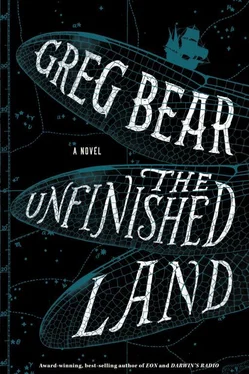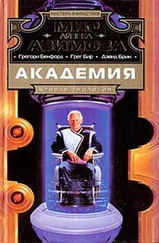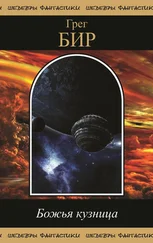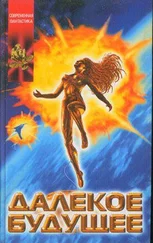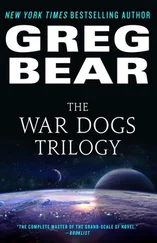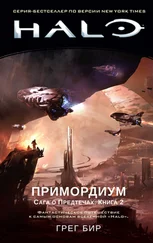Greg Bear
THE UNFINISHED LAND
For Chloe and Allison:
Brave Voyagers
“To gain a fact is to lose a dream.”
—OGMIOS
“A legend is entitled to be beyond time and place.”
—COCTEAU
Map: The Northernmost Isle of Tir Na Nog

Far to the north, west of dream and east of knowledge, there lay a great ring of islands where life and time began, known to some as the Atlantides, and to others as Tir Na Nog. Still others remember them as the islands of Queen Hel, the most radiant but difficult of aspect, and name them the Fingers of Dis. But Hel hath not been seen for thousands of years…
There is no history before these islands. Here, surrounded by a thick, constant mist, are the seven navels of thought and soul, where linger the origins and the shaping of all we know and love, and all we hate and fear—for the Earth and its sheltering sky, despite their seeming age, are deceptively young.

REYNARD SHOTWOOD, no longer a boy, not yet a man, had pushed the last of his dead shipmates overboard two days before. Rubbing crusted salt from his eyes, he tried to say another prayer for them and for himself, but his lips were broken and his tongue filled his mouth so he could not make the words.
His uncle and the crew, English fishermen from the coastal town of Southwold, had been cut to pieces by grapeshot from a Spanish galleass. Except for one finger, missing its tip to the knuckle, Reynard had not been touched. But now, a week or more later, he was parched and starving.
Unfamiliar currents carried him through a thick, night-gray fog that looped and writhed over the toppled mast and the shredded sails like a sky filled with maggots. He had spent long, numb hours watching the bloodless, broken bodies of his uncle, the uncle’s partner in the boat, and the partner’s son bump and bob against the timbers and upper step of the mast, caught in eddies that seemed to mimic the whorls in the fog, the bodies rolling now and then to show their faces—if they still had faces—and stare blankly, resentfully, as if he should help them climb back aboard and resume their duties.
Yare, fast away! He could almost hear his uncle’s cry as their boat tried to flee the Spanish, but it was only a patting breeze and waves slopping through the scuppers. Now the bodies were gone, sunk or grabbed by sharks, those snapping dogs of the sea—but the fog still turned the sun into a cold moon and shaded the moon as dim and gray as death itself.
The sloop-rigged hoy, once as hardworking a boat as ever harvested the sea, managed to stay afloat even with its larboard a mass of wrenched decking thrust through with broken timbers. The starboard, rising a few fingers above the dark, lapping water, likely held a bubble, but soon that would leak away and the wreck would sink and no one would ever know how long Reynard had been out here, alive, alone—but of course not afraid. Not now. The worst had happened, other than dying, and fishermen often died. Their names were carved into boards nailed on the walls of his family church—a good Protestant church. But dead all the same, and so many.
And now many more.
The great battle off the coast of Flanders had been long and fierce. Boats from Southwold had left their dozing harbor to serve the English fleet, at the command of Lord Walsyngham and the Queen, though the fishing season was but half done and many families might go hungry—but the desperate need of Elizabeth and of England against Philip’s devils overcame village sense.
With the awful memory of the seaborne power the English ships had faced, it was easy for Reynard to imagine the Duke of Parma’s soldiers filling the streets of London with forests of muskets and half-pikes, crested steel helms thick and shiny as shingle on a beach—and row upon row of great bronze Spanish cannons rolling, flaming, and bucking, blowing up homes and churches, intent on punishing all who followed the faith of Henry and Elizabeth and not Mary of ill regard. Maybe there was no home to return to.
Not the best sailor or apprentice, he had never wanted to go to sea, and yet had never found his place on land. His mother, a once-lovely woman who had withered early under the toll of being a fisherman’s widow, lamented her son’s pointless fascination with bushes and birds, ferrets and mice, snakes and turtles—more interested in studying the insides of fish than catching or making them ready for market. He could see her now, a sallow-faced, gray-haired figure, with a perpetual half-smile—though she was no idiot, and had taught him letters early on—pounding out washing or packing oysters and lobsters into barrels, graced with slimy, odorous seaweed, for sale in any of the five larger towns nearby, or even in London after a night journey, to avoid the heat of the summer sun.
Reynard was too numb for regrets, though he suspected that if he lived much longer, an unlikely prospect, he would have many. Could he regret not being more grateful for a home and a roof—though a leaky roof, thatch unchanged for years—or regret not being a better nephew, which he did not, not yet, and not much? Perhaps he could regret not having planned a way to keep the hoy clear of the galleass. His mind worked that way, regretting the undone and impossible, not the undone but doable. He preferred contemplating inventions and miracles, not plotting and planning actual work. He preferred reading to playing but had neither books nor companions, since his life was spent in service, mostly, to his uncle, with barely a day off in a month.
In what was left of the hoy, Reynard had recovered a cask of salt cod and two butts of water. One butt had been holed, and the second, poorly coopered, had leaked dry. The hoy had been meant to convey stores to the Queen’s great ships, but the promised supplies had not arrived in Southwold by the time the boats put out to sea. There should have been more victuals for the English fleet, from the shore, from the Queen, before they engaged—so his uncle had complained. Only Reynard had lived long enough to suffer for it. His uncle was a hard man, a tough master, but fair enough and smart, and despite everything, Reynard had loved him as a grizzled, thick-browed, heavy-jawed, masculine mountain in his young life.
Maybe now, pulling his feet from the water and going through these memories, he could find his regrets. But for the nonce, sharks were of more concern. Their low triangular fins popped up here and there, swishing, probing; they no doubt remembered they had found food around this wreck before. He did not want to further flavor the ocean with his toes.
He rose on wobbly legs, feet wedged against the gunwale to see any change in the flat gray sea. No change. In the days since the battle, the fog had tempted with its promise of moisture. He had carefully gathered the remains of the spritsail and knuckled a dip in the canvas to catch fog and rain, but the fog did not condense or drip, and there had been no rain since the easterly winds and violent storms had broken up the Spanish fleet.
Читать дальше
